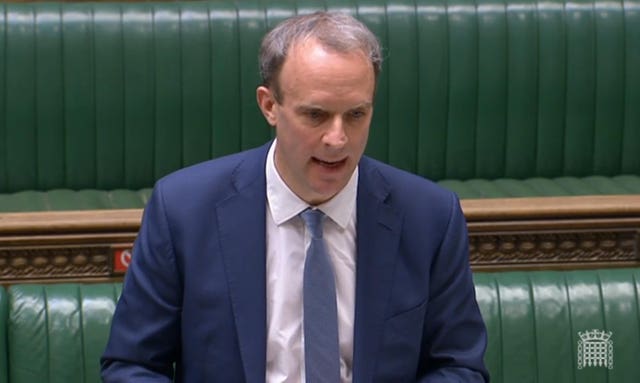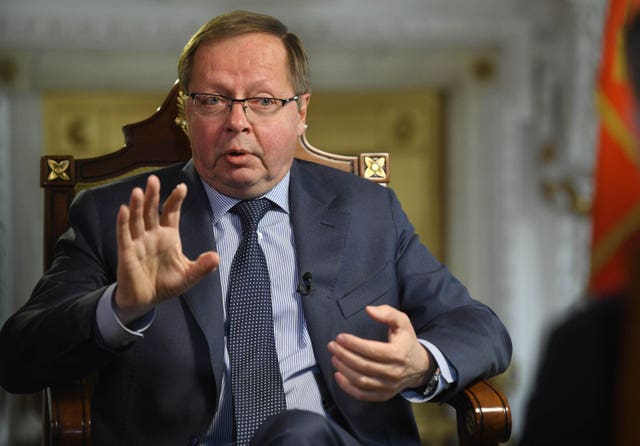Britain plans to force those working for foreign governments to sign a central register in a bid to counter hostile spy activity, the Home Office has confirmed.
Boris Johnson, according to the Times, is looking to formally announce the proposal in the Queen’s Speech next month, making it a criminal offence not to declare work in the UK on behalf of a foreign government.
The newspaper said the foreign agent registration scheme – which had already been announced by the Home Office – is part of the Prime Minister’s ambitions to strengthen powers to evict and prosecute spies operating in Britain for hostile states such as Russia and China.
The scheme follows the consideration of similar concepts by allies such as Australia and the US, according to the Home Office.
The move is understood to be a follow-through on the Government’s response to the Intelligence and Security Committee’s (ISC) report last year into allegations of Russian interference in British politics.
In its response, the Government vowed to be “resolute in defending our country, our democracy, and our values from such hostile state activity”.
The Times report said that other changes being prepared for May 11 would include an update to the Official Secrets Act so it can be used on state actors working from abroad, such as cyberhackers targeting Britain at the request of aggressive states.
Following the ISC’s findings, the Government said it would work with allies to “counter disinformation, as well as to bear down on illicit finance, combat influence operations, and fend off cyber-attacks”.
The development comes as relations with Moscow disintegrated further after Foreign Secretary Dominic Raab said the UK Government “stands in full support” with the Czech Republic as it seeks to catch two men who were using passports with the same names as those believed to be responsible for the Salisbury Novichok attack.
Czech authorities published photos of two foreign citizens who visited the country in 2014 and asked the public for any information about them in a move thought to be linked to a huge ammunition depot explosion in the town of Vrbetice in 2014.
The two were using Russian passports and were identified as Alexander Petrov, 41, and Ruslan Boshirov, 43.

Petrov and Boshirov are wanted by police in the UK after the Crown Prosecution Service authorised charges against them in connection with the attempted killing of Sergei Skripal in Salisbury on March 4 2018.
Mr Raab said: “We are as determined and committed as ever to bring those responsible for the attack in Salisbury to justice, and commend the actions of the Czech authorities to do the same.
“Russia must desist from these actions, which violate the most basic international norms.”
In a further sign of escalating tensions, the Russian ambassador to the UK Andrey Kelin said he had not seen Mr Raab for more than a year.
On Monday, former MI6 chief Sir John Sawers estimated that only 10% of Russian aggressive intelligence operations taking place in Europe are uncovered.
He told BBC Radio 4’s Today programme: “It shouldn’t be a surprise that Russian intelligence are very active across Europe, and I think the Czechs have pieced this together really rather well.
“It all has the hallmarks of a Russian intelligence operation, and I think the Czechs have got these two people who tried to assassinate Sergei Skripal in Salisbury, I think they’ve got them bang to rights.”
He added: “We see the extent of Russian aggressive intelligence activities across Europe, we probably only know 10% of what they’re doing. There will be a great deal that intelligence services do that we’re simply not aware of.”
Last week, the Foreign, Commonwealth and Development Office (FCDO) joined US counterparts as it declared it was “highly likely” that Russia’s foreign intelligence agency SVR was behind the so-called SolarWinds hack, a major cyber attack on the West.
Mr Kelin was summoned to the Foreign Office to be told the UK will continue to work with allies “to call out and counter malign operations” by Moscow’s spies.

Speaking to the BBC, Mr Kelin said: “If Dominic Raab is really seeing how Russia interferes or demolish (sic) democracy, I am ready to discuss it with him.
“But I haven’t seen Secretary Raab for more than a year.
“When I came here a year and some months ago, I was full of aspirations that we can do better but in recent years our relations have become worse.”
The Queen’s Speech, in which the monarch sets out the Government’s legislative agenda, is set to be a scaled-down affair due to the pandemic.
The State Opening of Parliament normally forms the most colourful event of the parliamentary year and is steeped in tradition and customs dating back centuries.
But Downing Street has said this year’s event, in light of restrictions to curb infections, will involve significantly fewer MPs and peers in attendance, a reduced royal procession into the House of Lords where the speech is given from and no diplomatic or non-parliamentary guests will be permitted.




Comments: Our rules
We want our comments to be a lively and valuable part of our community - a place where readers can debate and engage with the most important local issues. The ability to comment on our stories is a privilege, not a right, however, and that privilege may be withdrawn if it is abused or misused.
Please report any comments that break our rules.
Read the rules hereLast Updated:
Report this comment Cancel